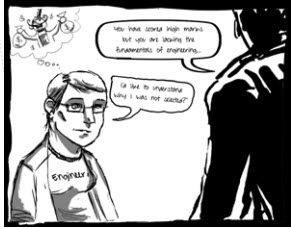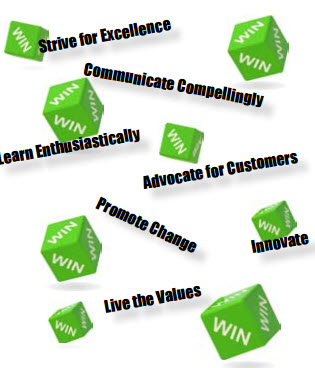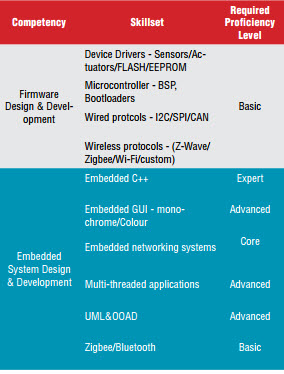This is the story of Vivek who hails from a small town. Right from his childhood, his dream was to become an Engineer. To fulfill his dream, he had joined a good engineering college and chose the Mechanical Engineering stream. He was studying well and always scored first class at all the semester examinations conducted by the University. He was all set to participate in the campus interviews so that he could join a product company.
The day came where one of his dream product companies was in the campus to select engineers. Vivek prepared for the campus interview by brushing up on the subjects from previous semesters. He was not able to sleep the previous night as he was so thrilled and excited. He appeared for the selection process and took the written test. He sat with a thumping heart, when the company representative started reading the names of students who had been shortlisted... Sashi, Karthik, Sekar… and the last name was Vivek. Once he heard his name, he began to relax. Further selection process followed and he was called for a technical interview.
When he entered the room, he saw few of his own seniors being part of the interview panel. He was excited and felt that he would surely be selected. Vivek was struggling to answer during the 45 minutes of Q&A, though he tried his best. He came out with tears in his eyes because he knew he could have done much better in the interview. In the evening, the names that made it to the finals were called out and there were only 3 names - James, Shreya and Riaz. Vivek had done better than these three during the 4 years of Engineering and he knew that all of them had lower percentages than him. He was heartbroken that his dreams were shattered.
Do you have just a passport or a visa & an air ticket as well?
After the interviews, all the students had left but he was still sitting there, dejected. Later he saw his seniors who interviewed him walk out. One of them saw Vivek and came to him. He asked Vivek, "We have already announced the results and why are you still waiting here?" With a low voice Vivek asked "I'd like to understand why I was not selected?" One of the seniors sat next to him and said,"You have scored high marks in your academics and you will be getting your Engineering degree shortly, but you are lacking the fundamentals of engineering… which is the foundation for an engineer to work in a product company. Also, it is not important that you know something - it is even more important to communicate that effectively to your audience." He continued saying "Your Engineering degree is like a passport for foreign travel. You cannot travel with just a passport - you need a visa and an air ticket. Your visa is your fundamental knowledge of Engineering, and your ability to communicate what you know is your air ticket. Without this you cannot fly." Slowly it dawned on Vivek that just high scores in exams are not going to help him to have a good career, and his mind seemed cleared now. He got up, thanked his senior and walked back realizing what he has to do. Vivek's is a story that one can learn from. In order to succeed in todays competitive environment, one need to take that extra step beyond just academic excellence.

At Ingersoll Rand, we encourage and value engineers with in-depth technical knowledge along with core & leadership competencies. In our journey to create a "best in class" Technology Centre at Ingersoll Rand India, we launched the Technical Competencies Framework with the objective of identifying the technical competencies required for our annual and 3 year long range plans. This framework enabled us to develop a competency evaluation mechanism and complete the current state assessment of available competencies within the Technology Centre. A database is now available with the competency levels of each employee assessed by the employee and manager. This feeds into our development planning and enables us to arrive at specific plans to improve the skills of our engineers.
This broadly defines the blueprint for elevating the performance of a Software Engineer in the embedded space. In addition, at Ingersoll Rand; we focus on a set of core competencies to measure how the objectives were achieved.

An organization typically starts with a vision and purpose and then further breaks that down to objectives for the next three years. This leads to focussing on:
- 1.Markets where it wants to operate
- 2.Products which it wants to create
- 3.Technologies which it wants to develop/acquire to create the relevant products.
Based on the above objectives, it then becomes important to define what competencies are needed in the organization. An important part of the planning is to define which competencies need to be developed internally and which need to be acquired externally. A sample competency chart for an Embedded Software Engineer at a particular level is given below:

If you are an engineer aspiring to work in a product company, it then becomes important to understand what technical competencies are needed in the market/industry. You will need to then map that with your interest area and focus on sharpening the relevant competencies and skillsets. Certifications in the core area add to enhancing the competency level. For example, if the core area is Firmware - certification in Firmware will help in improving your competency-level and getting you better prepared for your practical experience in this area. At the minimum, it can take you to the basic proficiency levels required in the area.
Having said this, Corporates also notice that there is a challenge in understanding the fundamentals of Engineering - statistics say that a large proportion of engineers graduating are not readily employable. So, while you build on specific competencies consider how strong your fundamentals are and how confident you are of clearing the written tests which is part of the selection process of most tech companies.
The National Employability Report of engineering graduates (2011) reveals the following findings which also confirm the challenge that Corporates are facing today. Even though India produces more than 5 lakh engineers annually, only 17.45% of them are employable for the IT services sector and only 2.68% are employable in IT product companies, which require greater understanding of Computer Science and Algorithms. Hence, it is important to make sure that it is not only important to qualify yourself but also to make sure that you become employable by acquiring and equipping yourself with the right set of competencies required for the sector you are interested in.
About the Author
Shirin Salis is the Vice president of Human Resources at Trane Technologies, India formerly known as Ingersoll-Rand.